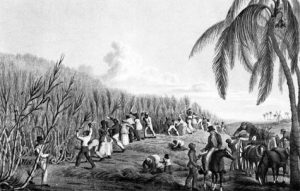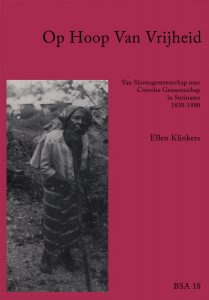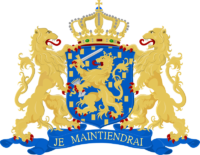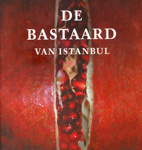Antonio Carmona Báez ~ After Hurricane Maria We Need To Reconstitute
This summer, the Netherlands and the world came to know Puerto Rico through the all-time most popular music video Despacito, which received over 3 billion hits on Youtube. But Puerto Rico has never been mentioned in Dutch news as much as it had throughout the last three weeks. First with Hurricane Irma which -besides depopulating smaller islands, nearly destroyed the Dutch and French territory of neighbouring St. Maarten, bringing 600 refugees to Puerto Rican hospitals and shelters. Another thousand refugees arrived from the Virgin Islands. However, this was only a precursor to a deadlier category 4/5 storm system ravaging the smallest island of the Greater Antilles.
Hurricane María pounded the US territory of Puerto Rico, leaving over 3 million people without electricity and clean running water. The hurricanes came and left, but the height of misery is yet to be experienced. Electricity workers claim that 80 percent of the island’s electric cables are insalvable, and hospitals are now totally dependent on diesel generators. While thirteen people have been declared dead to date, the death toll is surely to rise, as 70% of the island is incommunicado.
In a sense, the tropical weather systems have brought us, Puerto Ricans in the Caribbean and in the diaspora, closer to realise what we have in common with other islands: our delicate modernity and dependent vulnerability. Through Irma, we have become more aware of our neighbouring St. Maarten. The similarities of our territorial status in relation to the metropolises have also become more apparent. St. Maarten’s territorial status within the Kingdom is very similar to Puerto Rico’s relationship with the United States; both territories, just like Curaçao, have a Fiscal Control Board (College Financiële Toezicht) running local public expenditures from The Hague and from New York. In Puerto Rico and St. Maarten, it is now the military at the airports, running rescue and reconstruction. But the most striking similarities are those found in how our people back home are presented in the media: helpless, thirsty and prone to “looting”, ever moreso dependent on the greatness of those governments under which he have been subordinate for a long time.
Go to: http://curacaochronicle.com/after-hurricane-maria-we-need-to-reconstitute/
New Urban Collective ~ The Black Archives
 The Black Archives is a unique historical archive for inspiring conversations, activities and literature from Black and other perspectives that are often overlooked elsewhere.
The Black Archives is a unique historical archive for inspiring conversations, activities and literature from Black and other perspectives that are often overlooked elsewhere.
Did you know that in the 70s and 80s all Surinamese emancipation movements were actively working to combat racism and inequality? These stories and histories can be found in The Black Archives: an unique collection of books, archives and artifacts, which are the legacy of black writers and scientists. The Black Archives documents the history of black emancipation movements and individuals in the Netherlands, preserving and making it visible and accessible to a wide audience.
The archives are located in the premises of the Association Our Suriname in eastside Amsterdam. The growing archive currently consists of more than 4,000 special historical books, documents, photographs, films and artifacts around the Surinamese and black history in the Netherlands. In preparation for the 100th anniversary of the Society (in 2019) we, for the first time, want to make this history accessible to a wide audience.
Go to: http://www.theblackarchives.nl/
Trace Your Caribbean Ancestors Like Liz Bonnin
 Inspired by Liz Bonnin’s episode? Who Do You Think You Are? television series genealogist Laura Berry highlights the wide range of resources available for researching ancestors from the Caribbean
Inspired by Liz Bonnin’s episode? Who Do You Think You Are? television series genealogist Laura Berry highlights the wide range of resources available for researching ancestors from the Caribbean
Irish presenter Liz Bonnin was born to a French Martinican father and Trinidadian mother with Indian and Portuguese ancestry. Such an exotic cultural mix is a reflection of the diverse populations that settled in the Caribbean, whether by choice or by force.
The history of the Caribbean islands was dominated by sugar and slavery from the 16th century, when the first European colonies were established there. African slaves were transported to the islands in huge numbers by the 18th century, and slavery was not abolished in the British Caribbean until 1838, in the French Caribbean until 1848 and in the Dutch Caribbean until 1863.
Unfortunately, researching slave ancestry using documentary sources is often complicated and might not be possible at all before these dates. Even after slavery was abolished, family history research can be difficult because children were frequently born out of wedlock and subsequently registered with their mother’s surname and they sometimes adopted their father’s surname when they grew up.
Read more: http://www.whodoyouthinkyouaremagazine.com/trace-your-caribbean-ancestors-liz-bonnin
Ellen Klinkers ~ Op hoop van vrijheid. Van slavensamenleving naar Creoolse gemeenschap in Suriname, 1830-1880.
 De afschaffing van de slavernij op 1 juli 1863 is het hoogtepunt in de Surinaamse geschiedenis. Bijna 33.000 mensen werden vrij. Wat gebeurde er met de samenlevingen die op de plantages waren ontstaan? Welke keuzes had en maakte de vrije bevolking na 1863? Hoe ontstond één Creoolse gemeenschap in Suriname uit al die plantagesamenlevingen? Die vragen staan centraal in de dissertatie waarop ik in 1997 aan de Universiteit Leiden promoveerde.
De afschaffing van de slavernij op 1 juli 1863 is het hoogtepunt in de Surinaamse geschiedenis. Bijna 33.000 mensen werden vrij. Wat gebeurde er met de samenlevingen die op de plantages waren ontstaan? Welke keuzes had en maakte de vrije bevolking na 1863? Hoe ontstond één Creoolse gemeenschap in Suriname uit al die plantagesamenlevingen? Die vragen staan centraal in de dissertatie waarop ik in 1997 aan de Universiteit Leiden promoveerde.
Echt vrije burgers werden de Creoolse plantagearbeiders pas tien jaar later op 1 juli 1873, toen het Staatstoezicht werd opgeheven. Tot die tijd waren zij nog aan de plantages gebonden. Wel mochten zij zelf beslissen waar ze werkten en kregen zij betaald voor hun werk. Die overgangsperiode tussen slavernij en vrijheid beschermde de planter tegen een leegloop van zijn bedrijf.
In mijn boek bespreek ik de laatste decennia van de slavernij, het staatstoezicht en eerste jaren van volledige vrijheid. Ik maakte gebruik van de dagboeken van de Herrnhutters en van rechtszaken. Die documenten brachten mij zo dicht mogelijk bij de mensen die zelf nooit een stem kregen in de bronnen.
Op hoop van vrijheid is in 1997 verschenen. Het woord slaaf is nu omstreden, maar was toen gangbaar. Het boek is al lang niet meer leverbaar.
Het boek in PDF-formaat is hier te downloaden: http://ellenklinkers.nl/op-hoop-van-vrijheid/
Dutch Caribbean Digital Platform
The Dutch Caribbean Digital Platform is online since 2 November 2015
We – the University of Curaçao Library – are in the process of optimizing the system and building our collections. Much of the content still has ‘restricted access’. For these items, we are in the process of clearing copyright issues. If you are the copyright owner of one of these items, please contact us through library@uoc.cw or call Margo Groenewoud, (5999) 7442236.
Upcoming events
In November and December 2015, we will organise meetings both on Curaçao and in The Netherlands to demonstrate the platform to our stakeholders. We need your help to open up us much content as possible, in the interest of our community and for optimal use in education and research.
If you want to know more or want to be invited to one of these meetings, please let us now through library@uoc.cw.
See: http://dcdp.uoc.cw/
Digital Library Of The Caribbean
 The Digital Library of the Caribbean (dLOC) is a cooperative digital library for resources from and about the Caribbean and circum-Caribbean. dLOC provides access to digitized versions of Caribbean cultural, historical and research materials currently held in archives, libraries, and private collections.
The Digital Library of the Caribbean (dLOC) is a cooperative digital library for resources from and about the Caribbean and circum-Caribbean. dLOC provides access to digitized versions of Caribbean cultural, historical and research materials currently held in archives, libraries, and private collections.
Go to: http://www.dloc.com/




